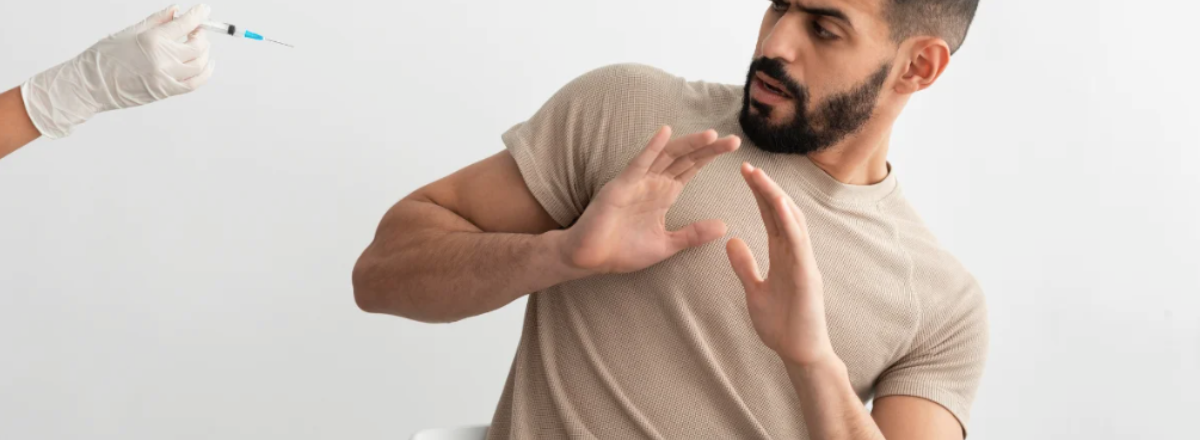The government is urging key groups to have their free flu vaccines as soon as possible, in order to be fully protected by the time flu season is in full swing.
This year’s annual vaccine roll-out is expected to prevent around 25,000 hospital admissions, based on last year’s figures. Last year’s flu season led to more than 14,000 excess deaths (source: UKHSA).
Although not everyone is eligible for a free flu vaccine, it is also available privately for people to pay for, should they wish.
So who really needs the flu vaccine this year and what happens if you’re vaccine exempt? ZoomDoc has the answers …
Why doesn’t everyone get a free flu vaccine?

Flu vaccination is safe and effective. It’s offered every year through the NHS to help protect people at risk of getting seriously ill from flu.
Firstly due to cost but also because healthy adults should have the ability to fight off the flu.
Therefore the government takes advice from the Joint Committee on Vaccination and Immunisation (JCVI), which recommends the key groups who might be most likely to suffer complications from flu, or most likely to spread it.
Who’s eligible for free flu vaccines this year?

The flu jab is free if you are aged 65, have an underlying medical condition, pregnant and primary school children.
Every year health experts look at key groups of vulnerable people who could be worst affected by flu. This year this includes:
Pregnant women – Catching flu during pregnancy increases your risk of complications. Your baby is also at increased risk of premature birth, stillbirth or death, says NHS advice. The flu vaccine is safe to have at any stage of your pregnancy.
Toddlers and young children – Pre-school children (aged 2 and 3 years) and all children at primary school will be offered the nasal spray via their GP or through school vaccination programmes this term. Last year, more than 10,000 children were admitted to hospital and latest data shows the flu vaccine reduced the risk of hospitalisations by two-thirds in children (source: UKHSA).
NHS advice confirms ‘any child who catches flu after vaccination is less likely to be seriously ill or be admitted to hospital.’
Secondary school children – This year, the government has expanded the flu vaccine programme to include over 3 million secondary school pupils in years 7 to 11. For the first time, this age group will be eligible to have the vaccine given as a nasal spray, through their school’s vaccination programme this term.
All pupils are being urged to take up the flu vaccine to protect themselves and their loved ones from falling unwell.
Over 65s – Elderly people are at increased risk of complications of flu, due to your immune system naturally being weaker with age. Complications can include pneumonia, which can be fatal.
Other eligible groups for a free flu vaccine are:
- people living in a residential or nursing home
- carers of an older or disabled person
- anyone living with someone who has lowered immunity due to disease or treatment
- frontline health or social care workers.
Can I pay to have a flu vaccine?

People aged 50-64 will not be eligible for a free flu jab in the 2023/24 season, they will have to go privately.
Yes, if you’re not eligible for a free vaccine you can pay for a private jab. Some employers will arrange this to help keep employees flu-free and fit to work this winter. However, it’s your choice if you want to take them up on it.
If it’s not provided through work, you can still book your own private flu jab via pharmacies such as Pharmacy2U and Whitworth Pharmacy who provide this service for around £13-£19.
I had a flu vaccine last year. Do I still need one?
Yes, protection doesn’t last a lifetime so you will need an annual vaccine. The vaccine is also tailored each year towards the key strains predicted to circulate. These can vary each year so having an annual vaccine will be your best way of being protected.
Here are 6 important reasons to get vaccinated this autumn.
Who should not have the flu vaccine?
You should not have the flu vaccine, even if you’re eligible for it, if you:
- have been allergic to previous flu vaccines
- are allergic to any of its ingredients
- have an egg allergy
- have a weak immune system
- are severely asthmatic
If you have a fever on the day of the vaccine you’ll need to have it once the fever has gone.
If you don’t eat gelatin, an ingredient used in the most common flu vaccine given, for religious reasons then you may be able to have an alternative vaccine.
Vaccine exempt?

One should avoid having the flu vaccine if one has had a serious allergic reaction to a flu vaccine in the past.
Can’t have a vaccine and need to prove why?
ZoomDoc offers Vaccine Exemption certificates for when you need to show evidence for not having a specific vaccine.
This may be unlikely with something like the flu vaccine but may be required for other vaccines required for work or travel purposes.
For instance, if you can’t have yellow fever, typhoid or others for travel purposes, our doctors can provide you with a same-day medical certificate that will confirm which vaccine you are advised against being given, due to associated health risks.
